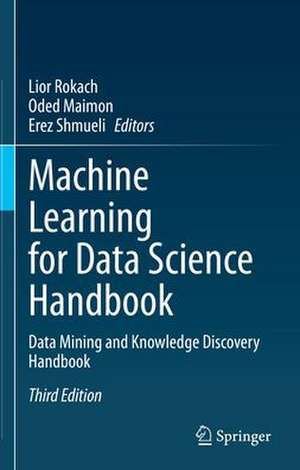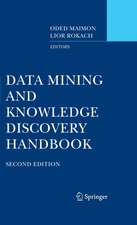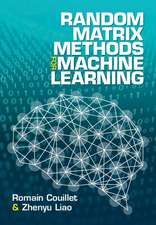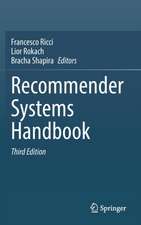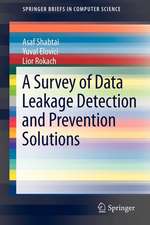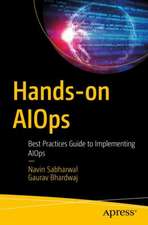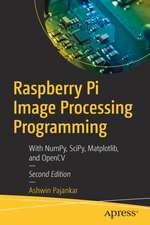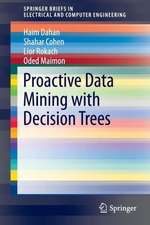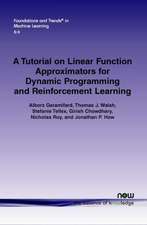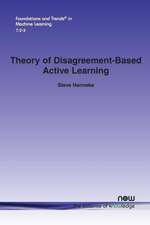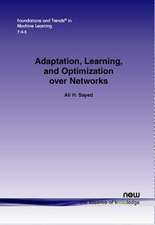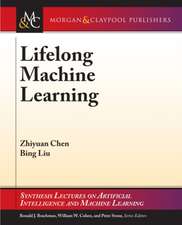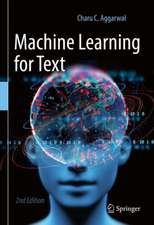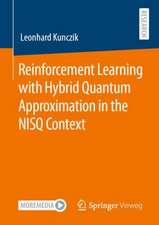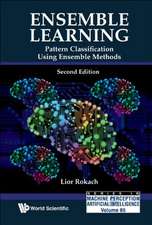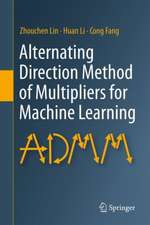Machine Learning for Data Science Handbook: Data Mining and Knowledge Discovery Handbook
Editat de Lior Rokach, Oded Maimon, Erez Shmuelien Limba Engleză Hardback – 18 aug 2023
This comprehensive handbook also presents a coherent and unified repository of data science major concepts, theories, methods, trends, challenges and applications. It covers all the crucial important machine learning methods used in data science.
Today's accessibility and abundance of data make data science matters of considerable importance and necessity. Given the field's recent growth, it's not surprising that researchers and practitioners now have a wide range of methods and tools at their disposal. While statistics is fundamental for data science, methods originated from artificial intelligence, particularly machine learning, are also playing a significant role.
This handbook aims to serve as the main reference for researchers in the fields of information technology, e-Commerce, information retrieval, data science, machine learning, data mining, databases and statistics as well as advanced level students studying computer science or electrical engineering. Practitioners working within these related fields and data scientists will also want to purchase this handbook as a reference.
Preț: 1654.56 lei
Preț vechi: 2068.20 lei
-20% Nou
Puncte Express: 2482
Preț estimativ în valută:
316.68€ • 326.35$ • 267.36£
316.68€ • 326.35$ • 267.36£
Carte tipărită la comandă
Livrare economică 01-15 martie
Preluare comenzi: 021 569.72.76
Specificații
ISBN-13: 9783031246272
ISBN-10: 3031246276
Pagini: 985
Ilustrații: VII, 985 p. 214 illus., 156 illus. in color.
Dimensiuni: 155 x 235 mm
Greutate: 1.56 kg
Ediția:3rd ed. 2023
Editura: Springer International Publishing
Colecția Springer
Locul publicării:Cham, Switzerland
ISBN-10: 3031246276
Pagini: 985
Ilustrații: VII, 985 p. 214 illus., 156 illus. in color.
Dimensiuni: 155 x 235 mm
Greutate: 1.56 kg
Ediția:3rd ed. 2023
Editura: Springer International Publishing
Colecția Springer
Locul publicării:Cham, Switzerland
Cuprins
Introduction to Knowledge Discovery and Data Mining.- Preprocessing Methods.- Data Cleansing: A Prelude to Knowledge Discovery.- Handling Missing Attribute Values.- Geometric Methods for Feature Extraction and Dimensional Reduction - A Guided Tour.- Dimension Reduction and Feature Selection.- Discretization Methods.- Outlier Detection.- Supervised Methods.- Supervised Learning.- Classification Trees.- Bayesian Networks.- Data Mining within a Regression Framework.- Support Vector Machines.- Rule Induction.- Unsupervised Methods.- A survey of Clustering Algorithms.- Association Rules.- Frequent Set Mining.- Constraint-based Data Mining.- Link Analysis.- Soft Computing Methods.- A Review of Evolutionary Algorithms for Data Mining.- A Review of Reinforcement Learning Methods.- Neural Networks For Data Mining.- Granular Computing and Rough Sets - An Incremental Development.- Pattern Clustering Using a Swarm Intelligence Approach.- Using Fuzzy Logic in Data Mining.- Supporting Methods.- Statistical Methods for Data Mining.- Logics for Data Mining.- Wavelet Methods in Data Mining.- Fractal Mining - Self Similarity-based Clustering and its Applications.- Visual Analysis of Sequences Using Fractal Geometry.- Interestingness Measures - On Determining What Is Interesting.- Quality Assessment Approaches in Data Mining.- Data Mining Model Comparison.- Data Mining Query Languages.- Advanced Methods.- Mining Multi-label Data.- Privacy in Data Mining.- Meta-Learning - Concepts and Techniques.- Bias vs Variance Decomposition for Regression and Classification.- Mining with Rare Cases.- Data Stream Mining.- Mining Concept-Drifting Data Streams.- Mining High-Dimensional Data.- Text Mining and Information Extraction.- Spatial Data Mining.- Spatio-temporal clustering.- Data Mining for Imbalanced Datasets: An Overview.- Relational Data Mining.- Web Mining.- A Review of Web Document Clustering Approaches.- Causal Discovery.- Ensemble Methods in Supervised Learning.- Data Mining using Decomposition Methods.- Information Fusion - Methods and Aggregation Operators.- Parallel and Grid-Based Data Mining – Algorithms, Models and Systems for High-Performance KDD.- Collaborative Data Mining.- Organizational Data Mining.- Mining Time Series Data.- Applications.- Multimedia Data Mining.- Data Mining in Medicine.- Learning Information Patterns in Biological Databases - Stochastic Data Mining.- Data Mining for Financial Applications.- Data Mining for Intrusion Detection.- Data Mining for CRM.- Data Mining for Target Marketing.- NHECD - Nano Health and Environmental Commented Database.- Software.- Commercial Data Mining Software.- Weka-A Machine Learning Workbench for Data Mining.
Notă biografică
Prof. Oded Maimon is the Oracle chaired Professor at Tel-Aviv University, Previously at MIT. Oded is a leader expert in the field of data mining and knowledge discovery. He published many articles on new algorithms and seven significant award winning books in the field since 2000. He has also developed and implemented successful applications in the Industry. He heads an international research group sponsored by European Union awards.
Dr. Lior Rokach is a senior lecturer at the Department of Information System Engineering at Ben-Gurion University. He is a recognized expert in intelligent information systems and has held several leading positions in this field. His main areas of interest are Data Mining, Pattern Recognition, and Recommender Systems. Dr. Rokach is the author of over 70 refereed papers in leading journals, conference proceedings and book chapters. In addition he has authored six books and edited three others books.
Dr. Lior Rokach is a senior lecturer at the Department of Information System Engineering at Ben-Gurion University. He is a recognized expert in intelligent information systems and has held several leading positions in this field. His main areas of interest are Data Mining, Pattern Recognition, and Recommender Systems. Dr. Rokach is the author of over 70 refereed papers in leading journals, conference proceedings and book chapters. In addition he has authored six books and edited three others books.
Textul de pe ultima copertă
This book is a major update to the very successful first and second editions (2005 and 2010) of Data Mining and Knowledge Discovery Handbook. Since the last edition, this field has continued to evolve and to gain popularity. Existing methods are constantly being improved and new methods, applications and aspects are introduced. The new title of this handbook and its content reflect these changes thoroughly. Some existing chapters have been brought up to date. In addition to major revision of the existing chapters, the new edition includes totally new topics, such as: deep learning, explainable AI, human factors and social issues and advanced methods for big-data. The significant enhancement to the content reflects the growth in importance of data science. The third edition is also a timely opportunity to incorporate many other changes based on peers and students’ feedback.
This comprehensive handbook also presents a coherent and unified repository of data science major concepts, theories, methods, trends, challenges and applications. It covers all the crucial important machine learning methods used in data science.
Today's accessibility and abundance of data make data science matters of considerable importance and necessity. Given the field's recent growth, it's not surprising that researchers and practitioners now have a wide range of methods and tools at their disposal. While statistics is fundamental for data science, methods originated from artificial intelligence, particularly machine learning, are also playing a significant role.
This handbook aims to serve as the main reference for researchers in the fields of information technology, e-Commerce, information retrieval, data science, machine learning, data mining, databases and statistics as well as advanced level students studying computer science or electrical engineering. Practitioners working within these related fields and data scientists will also want to purchase this handbook as a reference.
This comprehensive handbook also presents a coherent and unified repository of data science major concepts, theories, methods, trends, challenges and applications. It covers all the crucial important machine learning methods used in data science.
Today's accessibility and abundance of data make data science matters of considerable importance and necessity. Given the field's recent growth, it's not surprising that researchers and practitioners now have a wide range of methods and tools at their disposal. While statistics is fundamental for data science, methods originated from artificial intelligence, particularly machine learning, are also playing a significant role.
This handbook aims to serve as the main reference for researchers in the fields of information technology, e-Commerce, information retrieval, data science, machine learning, data mining, databases and statistics as well as advanced level students studying computer science or electrical engineering. Practitioners working within these related fields and data scientists will also want to purchase this handbook as a reference.
Caracteristici
Updated version of previous editions of Data Mining Knowledge Discovery Handbook Data science and machine learning major concepts, challenges are presented Offers a comprehensive, yet concise reference source for researchers, students and practitioners
